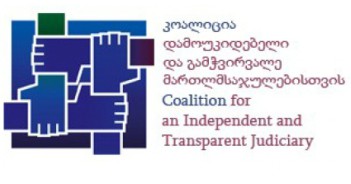Coalition for Independent and Transparent Judiciary Reacts to Magda Papidze Case Hearings
June 27, 2016

The Coalition for an Independent and Transparent Judiciary believes that the defendant’s right to privacy was violated in the process of hearing Magda Papidze’s case in court. The Prosecution’s violation of the right to privacy was especially harsh. Additionally, the court hearings were conducted with numerous procedural violations. All of the above may adversely affect the fair hearing of the case.
Additionally, we believe that the media coverage of the case often breaches the standards of ethical journalism, satisfying the public curiosity rather than legitimate public interest. Due to their inability to cover criminal cases professionally, often media outlets become the conduits for the prosecution or other interested parties’ interests. All of the above hinders serving justice and additionally violates the defendant’s rights to privacy and right to trial by jury.
The Right to Privacy
Naturally, the openness of trials is crucial for ensuring transparent and just proceeding; however, in special cases if private details of a party to trial are discussed, the hearing may be closed to the public. The Court makes the decision of closing the hearing in these instances according to the procedure prescribed by the law.
The Papidze hearings were partially closed twice to interrogate witnesses who were to discuss the defendant’s private and sexual details. Despite the closure of the hearings, both the prosecution and defense sides, and in one instance a witness, publicly disclosed details to the media that were discussed at a closed hearing. Additionally, at one hearing Papidze requested the Court to partially close the hearing because the Prosecution asked several questions of a private nature when interrogating a witness. In that instance the Judge did not correctly assess the legitimate grounds for closing the hearing and did not satisfy the defendant’s request, even though closure of the hearing would have served the purpose of protecting privacy of a trial’s participant.
Publicizing the information revealed at a closed hearing by the parties and witnesses, and then the covering of this information by the media without regard to the professional ethical standards, as well as inconsistence in the Court’s closure of hearings, all violate the defendant’s right to privacy. This can influence public opinion against the defendant, as well as the opinion of jurors, even though the final verdict in the case is not yet delivered.
The prosecutor’s publication of information from closed hearings, as well as the availability to the media of witness testimonies obtained during the investigative stage, are particularly disturbing. This is especially worrying given that the Prosecution is expected to protect fundamental human rights during court proceedings. These activities engender a substantiated suspicion that the Prosecution’s activities are directed towards influencing public opinion and reproducing gender stereotypes, all expressed in the message that the defendant has violated the strictly defined moral role of a woman, which should cause the society’s discriminatory and offensive disposition. With such efforts to influence public opinion the Prosecution is possibly trying to indirectly influence the jury and form their opinion of the defendant’s guilt.
Ensuring order in the Court room
The legislation guarantees the parties’ equal right to participate in court proceedings and their right to produce all important information without hindrance. These rights are an important precondition to a fair trial, and ensure party equality and the adversarial nature of proceedings. It is the Court that has the obligation to ensure that all parties have an equal possibility to participate in the Court proceedings and that the proceedings are conducted in a calm and orderly manner.
There were numerous instances of the attending public shouting insults towards the defendant at the hearings in Magda Papidze’s case. In some instances the Judge did not adequately react to the public’s behavior failing to do enough to secure order in the courtroom despite Papidze’s multiple requests because the situation was hindering witness interrogation. It must be stressed that Judge’s inconsistent approach to ensuring order in the courtroom in some instances further encouraged attendees’ disruptive behavior. The Judge’s excessive lenience or harshness can both harm the chances to effectively conduct a trial.
Both the Court and the Prosecution have the obligation to ensure a fair trial for the defendant. All ethical media outlets have an obligation to honor human rights when covering the crimes of high public interest. Hence, the Coalition calls on:
Prosecution:
• to stop publicizing information revealed at closed hearings; take all measures to prevent efforts to influence public opinion or the jury though discrediting the female defendant.
Court:
• to ensure an effective balance between the right to a public trial and the parties’ right to privacy.
• to appropriately use the legislative provisions regarding the closing of hearings, and in all instances of closed hearings require that all parties to the proceedings, including the Prosecution, not publicize information that became known at a closed hearing.
• to consistency use all relevant measures to ensure order in the courtroom so that parties are not hindered in presenting their case.
Media:
• to be guided by professional obligations and observe a balance between the public’s interest in information and a person’s right to privacy when covering the Papidze case.
News
December 13, 2023
Ethnic minorities outside the peace dialogue
November 6, 2023
‘Peace’ agenda of political parties
Popular
Articles
February 13, 2024



